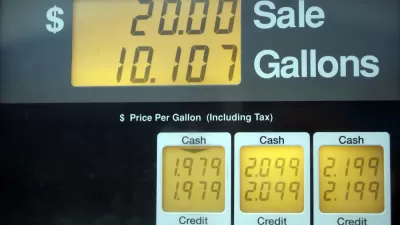If Gov. John Kitzhaber signs SB 810, as expected, Oregon will create a voluntary program for up to 5,000 motorists who will pay 1.5-cents for every mile they drive instead of the 30-cent state fuel excise tax.
Oregon was the first state to introduce a gas tax in 1919. Continuing in that leadership role in road user fees, they started a mileage-based user fees program as early as 2001 under the direction of the Oregon Department of Transportation (ODOT) that initiated two pilot programs, limited to about 44, selected participants. Now they appear ready to take it the next step by opening it up to the public as they develop the technology to take it state-wide.
Key to SB 810's passage was that it was voluntary, according to Queenie Wong of the Statesman Journal. It received bi-partisan support in both the Senate, where it was carried by Republican Senator Bruce Starr, passing 24-6 on Saturday, July 06, and in the House, by 47-13 on Sunday. Starr was quoted by Governing on Dec. 27, 2012:
The bottom line is it's about fairness, and people who use the system ought to pay for the use of the system," says Oregon state Sen. Bruce Starr, one of the leading advocates for VMT in his state. He says his state legislature will consider a bill in next year's session that would institute a VMT fee for any vehicle rated at more than 55 miles-per-gallon.
The bill Starr referenced was not the one that passed on July 07, but a more stringent, mileage-based user fee bill, HB 2453. It would have required "drivers with a vehicle getting at least 55 miles per gallon or the equivalent to pay 1.55 cents per mile after 2015 or $542.50 annually was referred back to committee. That legislation, which would require a three-fifths majority to pass, appears dead", according to Wong. However, it did manage to win passage through all the House committees. The 60% threshold on the House floor was insurmountable - at this time. Hence, vehicle-miles-traveled (VMT) fee proponents devised plan B - SB 810.
The mechanism to measure mileage driven - always a sticking point with VMT fee bills due to privacy concerns, will be left to ODOT and the Road User Fee Task Force, but it would seem that there would be many methods to choose from.
In previous pilot projects the state has done on the road usage charge, participants could track miles driven using a smartphone application, a geographic positioning system device or a reporting device without GPS. They were also given the option of recording miles without a gadget.
While the ultimate policy target of VMT fee legislation is to ensure that extremely fuel efficient and alternative vehicles that pay disproportionately low, or no fuel taxes, pay "their fair share" of road user fees to maintain roads, any motorist can opt in to the SB 810 program. Ironically, low fuel efficient motorists who join the program could receive a rebate rather than a bill, due to the 30-cent per gallon credit on gas purchased, explained Mr. Jim Whitty of ODOT.
Where SB 810 leads to largely depends on the success of the technology implemented by ODOT, the 5,000 motorists participating in the payment system, and the state legislature. Based on my discussion with Mr. Whitty, it would appear that the goal would be to return the stronger bill, HB 2453 to the legislature. Unlike a true VMT fee policy, Oregon would then have a two-tier, road user fee program: electric vehicles (EV) and 55+ MPG vehicles would pay VMT fees, while others would continue to pay fuel taxes. The alternative path would be to devise fixed, EV fees - where the EV motorist would pay the same annual fee regardless of how many miles it was driven.
FULL STORY: Lawmakers switch gears on per-mile road usage charge

Planetizen Federal Action Tracker
A weekly monitor of how Trump’s orders and actions are impacting planners and planning in America.

Map: Where Senate Republicans Want to Sell Your Public Lands
For public land advocates, the Senate Republicans’ proposal to sell millions of acres of public land in the West is “the biggest fight of their careers.”

Restaurant Patios Were a Pandemic Win — Why Were They so Hard to Keep?
Social distancing requirements and changes in travel patterns prompted cities to pilot new uses for street and sidewalk space. Then it got complicated.

Albuquerque Route 66 Motels Become Affordable Housing
A $4 million city fund is incentivizing developers to breathe new life into derelict midcentury motels.

DC Area County Eliminates Bus Fares
Montgomery County joins a growing trend of making transit free.

Platform Pilsner: Vancouver Transit Agency Releases... a Beer?
TransLink will receive a portion of every sale of the four-pack.
Urban Design for Planners 1: Software Tools
This six-course series explores essential urban design concepts using open source software and equips planners with the tools they need to participate fully in the urban design process.
Planning for Universal Design
Learn the tools for implementing Universal Design in planning regulations.
Heyer Gruel & Associates PA
JM Goldson LLC
Custer County Colorado
City of Camden Redevelopment Agency
City of Astoria
Transportation Research & Education Center (TREC) at Portland State University
Camden Redevelopment Agency
City of Claremont
Municipality of Princeton (NJ)



























